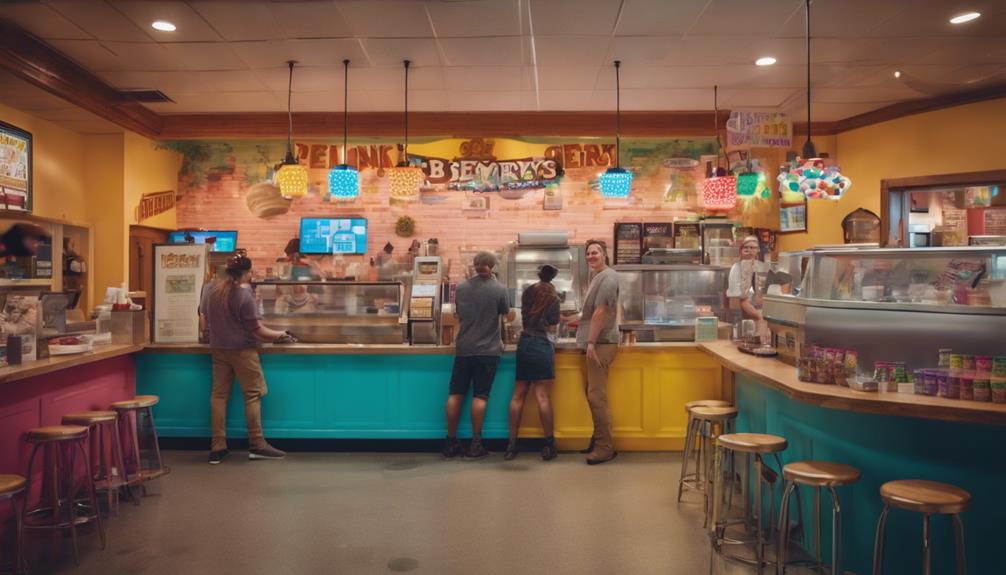Ben & Jerry's has achieved remarkable success by merging unique ice cream flavors with a strong commitment to social justice and environmental sustainability. Founded in 1978 by friends Ben Cohen and Jerry Greenfield, the brand quickly gained popularity for its playful marketing and ethically sourced ingredients. By emphasizing quality and community engagement, Ben & Jerry's has cultivated a loyal customer base and a distinctive brand identity. Their innovative approach to flavor and marketing keeps customers engaged. For those interested in the brand's journey and impactful practices, there's much more to uncover about how they continue to thrive.
Key Elements

In exploring the key elements of Ben & Jerry's success, it's crucial to understand the company's strong foundation and unique business model.
The overview highlights their commitment to quality and social responsibility, which attracts both customers and franchisees.
Gathering insights into franchisee information can reveal what makes partnering with this iconic brand a lucrative opportunity.
Company Overview
Ben & Jerry's, renowned for its commitment to social responsibility and innovative ice cream flavors, has built a strong brand identity that resonates with a loyal customer base. Founded in 1978, the company emphasizes quality and unique combinations, attracting food enthusiasts worldwide.
Its mission focuses on creating delicious ice cream while promoting social justice, environmental sustainability, and community engagement. Ben & Jerry's actively partners with farmers and suppliers who share its values, ensuring ethical sourcing of ingredients.
The brand's playful, quirky marketing further strengthens its connection to customers, making ice cream not just a treat, but an experience. This blend of quality, values, and creativity solidifies Ben & Jerry's position as a leader in the ice cream industry.
Business Overview
Building on its strong brand identity, Ben & Jerry's operates with a clear business model that emphasizes quality, innovation, and social responsibility in every aspect of its operations.
The company sources high-quality ingredients, prioritizing fair trade and sustainable farming practices. This commitment not only enhances product quality but also fosters positive relationships with suppliers and local communities.
Ben & Jerry's continually innovates its flavor offerings, appealing to diverse customer preferences while addressing social issues through its marketing campaigns. The company actively engages in political and environmental advocacy, reinforcing its brand values.
Information for Franchisees
Providing essential insights, potential franchisees can explore the unique advantages and support that come with partnering with Ben & Jerry's. The brand's strong recognition helps franchisees attract customers, while its commitment to sustainability fosters a positive community impact.
Interested individuals must submit an initial inquiry form and complete an application package to start the process. The franchise requires a minimum net worth of $350,000 and liquid capital of $100,000. Initial investments range from $155,900 to $549,300, with ongoing royalty and advertising fees based on sales.
Franchisees receive thorough training and ongoing support, ensuring they're equipped to run successful operations. Exclusive territories are granted, minimizing competition and enhancing local growth opportunities.
Company Overview

Ben & Jerry's has a rich founding story marked by key milestones that highlight its growth and evolution.
The company's commitment to social justice and environmental sustainability sets it apart in a competitive landscape.
Founders Ben Cohen and Jerry Greenfield established a brand that not only prioritizes delicious ice cream but also advocates for meaningful change.
Founding Story and Milestones
In 1978, two childhood friends, Jerry Greenfield and Ben Cohen, transformed a former gas station in Burlington, Vermont, into an iconic ice cream shop that would eventually grow into a beloved global brand.
Known for its quirky flavors and commitment to quality, Ben & Jerry's quickly gained a loyal customer base. The duo's innovative spirit led to the introduction of unique combinations, such as Cherry Garcia and Chunky Monkey. Following their success, Ben & Jerry’s continued to expand their flavor offerings, always staying true to their commitment to creativity and their dedication to using high-quality ingredients. This devotion to originality and deliciousness set them apart from other ice cream companies and solidified their place in the hearts of dessert lovers everywhere. Similarly, salt & straw’s story highlights their dedication to creating inventive flavors and their unwavering passion for crafting exceptional ice cream experiences.
By the mid-1980s, the company expanded distribution beyond Vermont, making its mark nationwide. In 1994, they opened their first factory in St. Albans, Vermont, further solidifying their presence.
With each milestone, Ben & Jerry's cultivated a reputation for creativity and community engagement, setting the stage for its future success. The company’s commitment to using fresh, locally-sourced ingredients contributed to its rise to fame and popularity. Ben & Jerry’s also made a name for itself by integrating social and environmental issues into its business practices, further solidifying its reputation as a socially responsible brand. This dedication to creativity, community engagement, and ethical practices has helped Ben & Jerry’s establish a legacy that rivals dickey’s barbecue pit legacy in the food industry.
Social Justice and Environmental Sustainability
Through its unwavering commitment to social justice and environmental sustainability, the company actively champions ethical practices that resonate with its core values and loyal customer base.
Ben & Jerry's prioritizes fair trade sourcing, ensuring farmers receive fair compensation while minimizing environmental impact. The company advocates for climate justice, endeavoring to reduce its carbon footprint through sustainable packaging and energy-efficient production methods.
Additionally, Ben & Jerry's engages in activism, supporting various social causes, including racial equality and LGBTQ+ rights. Their dedication to community involvement fosters local partnerships and promotes positive change.
Founders Ben Cohen and Jerry Greenfield
Founders Ben Cohen and Jerry Greenfield transformed their passion for ice cream into a beloved brand that emphasizes quality, creativity, and social responsibility. Their journey began in 1978 when they opened a small ice cream shop in Burlington, Vermont, using a unique blend of high-quality ingredients and innovative flavors.
Their approach resonated with customers, leading to rapid growth. Ben and Jerry's commitment to social causes, such as environmental sustainability and fair trade, set them apart in the industry.
Their fun, quirky branding and dedication to community engagement further solidified their popularity. Today, Ben and Jerry's stands as a reflection of the power of entrepreneurial spirit and the importance of aligning business with values, inspiring countless others along the way. In a world where profit often takes precedence over social and environmental responsibility, Ben and Jerry’s serves as a shining example of how businesses can make a positive impact. Their commitment to using ethically sourced ingredients and supporting social causes has earned them the admiration of consumers worldwide. In the tim hortons coffee empire history, Ben and Jerry’s stands out as a company that has proven that success and social responsibility can go hand in hand.
Competitive Landscape Overview
The competitive landscape for Ben & Jerry's showcases a vibrant array of ice cream brands vying for market share, each with unique offerings and strategies to attract consumers.
Key competitors include Häagen-Dazs, Baskin-Robbins, and Haagen-Dazs, all of which emphasize quality and flavor innovation.
Ben & Jerry's differentiates itself through its commitment to social responsibility and sustainability, appealing to a socially conscious demographic.
Additionally, the rise of artisanal and non-dairy brands has further intensified competition, pushing established players to adapt.
The brand's iconic flavor combinations and bold marketing strategies continue to resonate with its audience, but staying ahead requires constant innovation and engagement with evolving consumer preferences, making the competitive landscape both challenging and dynamic.
Brand Identity

Ben & Jerry's brand identity stands out in the global ice cream market, known for its unique flavors and commitment to social justice.
The company focuses on equity and advocacy, intertwining its mission with socially responsible sourcing practices.
This approach not only resonates with consumers but also reinforces its reputation as a leader in ethical business practices.
Global Ice Cream Popularity
Capturing the hearts of dessert lovers worldwide, ice cream continues to thrive as a beloved indulgence, with brands like Ben & Jerry's leading the way in unique flavors and social impact.
The global ice cream market has witnessed significant growth, driven by innovative offerings and changing consumer preferences. Gourmet and premium ice creams are gaining traction, appealing to those seeking new taste experiences.
Ben & Jerry's stands out with its fun flavor combinations, emphasizing quality ingredients and creativity. As health-conscious trends emerge, the brand adapts by introducing dairy-free and lower-calorie options.
This flexibility not only broadens its customer base but also reinforces its commitment to inclusivity, ensuring ice cream remains a cherished treat for all.
Social Justice and Equity Focus
Recognized for its innovative flavors, the brand also champions social justice and equity, integrating these values into its identity and operations.
Ben & Jerry's actively addresses societal issues, advocating for marginalized communities and promoting systemic change. Their commitment is evident in campaigns supporting racial justice, climate action, and LGBTQ+ rights, often using their platform to engage customers in these critical conversations.
The brand's activism aligns closely with its mission, fostering a sense of community among consumers who share these values.
Socially Responsible Sourcing Practices
Consistently prioritizing socially responsible sourcing practices, the brand guarantees that its ingredients are ethically sourced and support sustainable farming initiatives.
Ben & Jerry's collaborates with farmers and suppliers who adhere to fair trade standards, ensuring that producers receive fair compensation.
By focusing on high-quality, non-GMO ingredients, the brand promotes environmental sustainability and encourages biodiversity.
Additionally, they actively engage in initiatives that support animal welfare, such as sourcing cage-free eggs and humane dairy products.
This commitment to ethical sourcing not only enhances the quality of their ice cream but also strengthens their brand identity, resonating with consumers who value transparency and responsibility.
Ultimately, Ben & Jerry's dedication to socially responsible practices reinforces its reputation as a leader in the ice cream industry.
Information for Franchisees

Franchisees benefit from a structured support system that guides them through the process of opening and operating their businesses successfully.
After expressing interest, prospective franchisees complete an initial inquiry form, gaining access to the franchise learning center. They then fill out an application package following an introductory call. A company representative walks them through the Franchise Disclosure Document, ensuring they understand all aspects.
Conducting market research helps franchisees assess local demand, while initial training programs equip them with essential skills.
Ongoing support remains available to assist with daily operations, and exclusive territories are granted to prevent competition among franchisees.
This all-encompassing framework fosters a collaborative environment, enabling franchisees to thrive within the Ben & Jerry's brand.
Financial Requirements & Ongoing Fees

When considering a franchise with Ben & Jerry's, potential franchisees should be aware of the financial requirements involved.
The total investment can range from $155,900 to $549,300, with an initial franchise fee between $18,000 and $39,500.
Additionally, ongoing fees based on sales and marketing contributions will play a significant role in the franchise's financial landscape.
Total Investment Range: $155,900-$549,300
The total investment range for opening a Ben & Jerry's franchise spans from $155,900 to $549,300, encompassing initial fees and ongoing financial obligations.
This investment includes costs like equipment, signage, and leasehold improvements, as well as working capital to sustain the business during its early stages.
Franchisees must meet a minimum net worth requirement of $350,000, alongside a liquid capital requirement of $100,000.
Additionally, franchisees will face ongoing fees, which typically include royalty and advertising fees based on sales.
Understanding these financial requirements is vital for potential franchisees, as it guarantees they're well-prepared to manage their investment and operate a successful Ben & Jerry's location.
Initial Fee: $18,000-$39,500
Investing in a Ben & Jerry's franchise requires an initial fee that ranges from $18,000 to $39,500, reflecting the brand's established market presence and support system. This fee contributes to the extensive training and resources that franchisees receive, ensuring they're well-equipped to operate successfully.
The financial commitment underscores the value of joining a beloved brand known for its commitment to quality and sustainability. Franchisees benefit from the brand's loyal customer base, allowing for a smoother path to profitability.
Additionally, the initial investment is just one part of the overall financial picture. Prospective franchisees should be prepared for further financial requirements, including total investment estimates and liquid capital needs, to fully assess their readiness.
Ongoing Sales-Based Percentage Fees
Franchisees must budget for ongoing sales-based percentage fees, which include royalty and advertising costs tied to their sales performance. These fees typically range from a percentage of gross sales, ensuring that franchisees contribute to the brand's growth and visibility.
The royalty fees help maintain the franchise's operational standards and support essential services, while advertising fees fund marketing campaigns that bolster brand recognition.
By understanding these ongoing financial commitments, franchisees can better forecast their profitability and cash flow. Effective budgeting for these fees is vital, as it impacts the overall success of their business.
With careful financial planning, franchisees can thrive within the Ben & Jerry's framework while enjoying the benefits of being part of a renowned brand.
Marketing Contribution Percentage Fees
Ongoing financial commitments also include marketing contribution percentage fees, which are designed to enhance brand visibility and support collective advertising efforts.
These fees guarantee that all franchisees contribute to a unified marketing strategy, allowing Ben & Jerry's to maintain a strong presence in the competitive ice cream market.
By pooling resources, franchisees benefit from larger advertising campaigns that can reach a wider audience.
Typically, these fees are calculated as a percentage of gross sales, which helps align the interests of both the franchisor and franchisees.
This collaborative approach not only boosts sales but also strengthens the overall brand image, guaranteeing that Ben & Jerry's remains a beloved choice for consumers around the world.
Operational Supplies and Maintenance
Operational supplies and maintenance costs play an essential role in ensuring the smooth functioning of a Ben & Jerry's franchise, impacting both financial stability and customer satisfaction. Franchisees incur ongoing expenses for key items like ingredients, packaging, and equipment maintenance.
These costs can fluctuate based on market trends and seasonal demand, making accurate budgeting important. Additionally, franchisees must allocate funds for regular equipment servicing and repairs to prevent operational disruptions.
A well-maintained store attracts customers and enhances their experience, which ultimately drives sales. Ben & Jerry's also requires franchisees to pay ongoing royalty and advertising fees, which are typically a percentage of sales, further contributing to the overall financial landscape of franchise ownership.
Financing Options

When considering financing options for a Ben & Jerry's franchise, potential owners can explore flexible payment plans tailored to their needs.
In addition to traditional funding, alternative sources are available, offering diverse pathways to secure capital.
Government-backed loan providers also present viable opportunities for franchisees to access necessary funds.
Flexible Payment Options Available
Franchisees can explore various flexible payment options to ease their financial commitments and enhance cash flow management.
Ben & Jerry's offers tailored financing solutions that cater to diverse financial situations, making it easier for franchisees to invest in their businesses. These options may include installment plans, leasing arrangements, and deferred payment schedules, allowing franchisees to align payments with their revenue cycles.
Additionally, the brand encourages collaboration with financial institutions to secure favorable loan terms, helping franchisees manage startup costs effectively.
Alternative Funding Sources Available
In addition to flexible payment options, Ben & Jerry's franchisees can explore various alternative funding sources to help finance their business ventures.
They might consider crowdfunding platforms, allowing them to raise capital from a broad audience, or seek out angel investors who provide funds in exchange for equity stakes.
Franchisees can also tap into peer-to-peer lending services, which often offer competitive interest rates compared to traditional banks.
Additionally, community development financial institutions (CDFIs) can provide loans specifically aimed at supporting local businesses, particularly those with a strong community focus.
Finally, franchisees could explore partnerships with local businesses for joint funding opportunities, fostering collaboration while sharing financial responsibilities.
These options can empower franchisees to launch and grow their Ben & Jerry's shops successfully.
Government-Backed Loan Providers
Government-backed loan providers offer essential financing options for Ben & Jerry's franchisees, enabling them to secure the funding they need to launch and grow their businesses.
These loans typically feature lower interest rates and longer repayment terms than conventional loans, making them an attractive choice for new franchise owners.
Franchisees can access programs through the Small Business Administration (SBA), which guarantees a portion of the loan, reducing the risk for lenders.
This backing encourages financial institutions to lend to aspiring entrepreneurs who might otherwise struggle to qualify for financing.
With these resources, franchisees can invest in equipment, inventory, and marketing, ensuring a strong start and sustainable growth for their Ben & Jerry's locations.
Training & Support Offered

Ben & Jerry's provides robust training and support to guarantee franchisees succeed from the start.
They offer thorough onboarding sessions that equip new owners with essential knowledge, along with continuous skill enhancement workshops to keep their teams sharp.
Additionally, franchisees receive operational guidance and materials that streamline business processes and promote consistency across locations.
Comprehensive Onboarding Sessions Offered
Franchisees regularly participate in thorough onboarding sessions that provide essential training and support to secure successful business operations. These sessions cover crucial aspects of running a Ben & Jerry's franchise, including product knowledge, customer service, and operational procedures.
New franchisees learn how to manage inventory, maintain quality standards, and implement effective marketing strategies tailored to their local communities. Experienced trainers guide them through the company's values, emphasizing sustainability and community engagement.
This all-encompassing approach guarantees that franchisees feel confident and well-prepared as they launch their stores. Additionally, franchisees have the opportunity to connect with fellow new owners, fostering a sense of community and collaboration from the very start of their journey.
This support ultimately contributes to their long-term success.
Continuous Skill Enhancement Workshops
Offering ongoing skill enhancement workshops, Ben & Jerry's guarantees franchise owners stay updated on best practices and industry trends to maximize their business potential.
These workshops focus on various topics, including marketing strategies, customer service excellence, and sustainable practices, ensuring franchisees remain competitive.
By participating in these sessions, owners can hone their skills, share experiences, and learn from industry experts.
Ben & Jerry's also encourages collaboration among franchisees, fostering a supportive network that enhances collective knowledge.
This commitment to continuous learning helps franchise owners adapt to market changes and improve operational efficiency.
Ultimately, these workshops empower franchisees to provide exceptional experiences for customers while driving growth and profitability within their communities.
Operational Guidance and Materials
Thorough training and support materials equip franchise owners with the essential tools needed to successfully operate their businesses.
Ben & Jerry's provides an extensive franchise learning center, where new owners access valuable resources. They undergo initial training programs that cover everything from product knowledge to customer service strategies.
Ongoing support guarantees that franchisees can navigate challenges effectively, fostering a collaborative environment. Owners also receive guidance on market research and local demand assessments, which helps in making informed decisions.
Additionally, the franchise's commitment to sustainability and community engagement is woven into training, aligning business practices with brand values.
This all-encompassing approach empowers franchise owners, enhancing their potential for success while maintaining the integrity of the Ben & Jerry's brand.
LEGAL AND REGULATORY

In exploring the legal and regulatory landscape, Ben & Jerry's faces various compliance challenges that could impact its operations.
Understanding these regulations is essential for maintaining brand integrity and ensuring sustainable practices.
Franchisees must stay informed about potential changes that may affect their business model and local market conditions.
Key Sections to Review
When examining Ben & Jerry's success, it's crucial to focus on the legal and regulatory aspects that shape its operations.
The company must navigate various legal obligations, from compliance with health and safety regulations to understanding franchise laws.
Key Sections to Review
Maneuvering the legal and regulatory landscape is essential for franchisees to secure compliance and protect their investments.
Franchisees must familiarize themselves with key sections, including licensing requirements, health regulations, and environmental laws. Understanding these regulations helps mitigate risks and guarantees smooth operations.
Staying informed about potential regulatory changes also allows franchisees to adapt proactively, safeguarding their business's longevity and success.
Legal Obligations
Franchisees must navigate a variety of legal obligations to confirm compliance with licensing, health, and environmental regulations, which are essential for protecting their investments and maintaining smooth operations.
They must stay updated on local laws, adhere to safety standards, and guarantee proper waste management.
Failing to meet these obligations can lead to penalties, affecting both profitability and reputation in the competitive market.
MARKET ANALYSIS

In today's market, Ben & Jerry's stands out by embracing sustainable sourcing practices, aligning with the growing demand from health-conscious consumers.
This shift not only enhances the brand's appeal but also reflects a broader trend towards ethical consumption.
As more people prioritize health and sustainability, Ben & Jerry's positions itself to capture this evolving consumer sentiment effectively.
Sustainable Sourcing Practices Rise
Ben & Jerry's has recognized the rising demand for plant-based ice cream, reflecting a shift in consumer preferences toward healthier and sustainable options.
This growth in the plant-based sector not only aligns with their commitment to sustainability but also opens new avenues for market expansion.
As more consumers seek out environmentally friendly products, Ben & Jerry's is well-positioned to capitalize on this trend.
Plant-Based Ice Cream Popularity
How is the rising popularity of plant-based ice cream reshaping consumer expectations for sustainable sourcing practices?
Consumers now demand transparency and ethical sourcing, pushing brands to prioritize sustainability.
This shift encourages companies to adopt eco-friendly ingredients and practices, aligning with values that resonate with health-conscious and environmentally aware shoppers.
As a result, brands that embrace these standards are likely to thrive in today's competitive market.
Plant-Based Ice Cream Growth
The surge in demand for plant-based ice cream is driving brands to enhance their sustainable sourcing practices, aligning with consumers' increasing expectations for transparency and ethical ingredient sourcing.
Companies like Ben & Jerry's are prioritizing fair trade ingredients and environmentally friendly production methods, fostering trust and loyalty among consumers.
This trend not only boosts sales but also promotes a positive brand image in a competitive market.
Health-Conscious Consumers
Health-conscious consumers are increasingly shaping the market landscape, driving demand for products that align with their wellness goals.
As they prioritize healthier ingredients and transparency, brands like Ben & Jerry's must adapt to these shifting consumer preferences.
Understanding the demographics and trends within this group will be essential for the brand's continued success.
Health-Conscious Consumer Demographics
As consumers increasingly prioritize their well-being, brands like Ben & Jerry's are adapting to meet the demands of a more health-conscious demographic.
This shift includes targeting millennials and Gen Z, who often seek indulgent yet healthier options.
Consumer Preference Trends
Increasingly, consumers are gravitating towards brands that offer healthier alternatives without sacrificing taste, driving companies like Ben & Jerry's to innovate their product lines.
This shift is evident in the rising demand for low-calorie, dairy-free, and responsibly sourced ingredients.
EXIT STRATEGY

In exploring Ben & Jerry's exit strategy, it's crucial to understand the franchise buyback program and the guidelines for transferring ownership.
These procedures not only guarantee a smooth shift for franchisees but also maintain the brand's integrity.
Franchise Buyback Program Details
The franchise buyback program offers franchisees a strategic exit strategy, allowing them to sell their business back to the franchisor under favorable terms. This program provides an attractive option for franchisees looking to shift out of their investment while ensuring a smooth handover.
Franchisees can expect a fair valuation based on factors like location performance and sales history. The process aims to minimize disruption, reassuring both franchisees and customers during the shift.
Additionally, the buyback program reflects Ben & Jerry's commitment to supporting franchisees, promoting long-term relationships, and maintaining brand integrity. By facilitating this exit strategy, the company enhances its reputation while empowering franchisees with a clear path forward when they're ready to move on.
Franchise Transfer Guidelines and Procedures
Franchise transfer guidelines outline the steps franchisees must follow to smoothly shift ownership of their business to a new buyer.
Initially, the franchisee needs to notify Ben & Jerry's of their intent to sell. They must then provide details about the prospective buyer, who'll undergo a vetting process to guarantee they meet the franchise's standards.
Once approved, franchisees need to submit a formal transfer request along with any required documentation. Financial obligations, including outstanding fees, must be settled before the transfer can occur.
ADDITIONAL RESOURCES

Ben & Jerry's provides franchisees with essential support resources to guarantee their success.
They offer a dedicated franchisee support hotline, allowing quick access to assistance whenever needed.
Additionally, franchise networking opportunities foster connections among franchisees, enhancing collaboration and shared growth.
Franchisee Support Resources
Accessing a wealth of support resources empowers franchisees to navigate the complexities of business ownership effectively.
Ben & Jerry's provides various tools and materials designed to facilitate franchisee success. From extensive training programs to detailed operational manuals, these resources cover essential aspects of running a franchise.
Franchisees can also tap into marketing support that includes promotional materials and strategies tailored to their local markets.
Additionally, they benefit from ongoing education opportunities, ensuring they stay informed about industry trends and best practices.
This robust support network fosters a collaborative environment where franchisees can share experiences and insights, ultimately enhancing their business performance and driving growth within the Ben & Jerry's community.
Franchisee Support Hotline
A dedicated franchisee support hotline offers immediate assistance and guidance, ensuring that franchise owners have quick access to the resources they need for smooth operations. This hotline is staffed by knowledgeable professionals who understand the unique challenges faced by franchisees.
Whether it's a question about inventory management, marketing strategies, or operational procedures, franchisees can rely on expert advice at any time. The hotline also provides updates on company policies and best practices, helping franchise owners stay informed and compliant.
Additionally, this support fosters a sense of community among franchisees, promoting collaboration and shared success. With this invaluable resource, Ben & Jerry's franchisees can confidently navigate their business journey and focus on delivering exceptional customer experiences.
Franchise Networking Opportunities
Franchise networking opportunities regularly offer franchisees valuable connections and resources to enhance their business success.
By participating in franchise events, franchisees can engage with peers, share best practices, and learn from each other's experiences. These gatherings often feature industry experts who provide insights into market trends and innovative strategies.
Additionally, franchisees can access a wealth of knowledge through online forums and support groups, fostering a sense of community. Collaboration with fellow franchisees can lead to joint marketing initiatives and bulk purchasing agreements, ultimately driving profitability.
Conclusion
To summarize, Ben & Jerry's franchise model stands out for its blend of delicious flavors and strong ethical values.
Aspiring franchisees can tap into a well-established brand that prioritizes community engagement and sustainability, ensuring both business growth and positive impact.
With extensive support and a loyal customer base, Ben & Jerry's offers a unique opportunity for entrepreneurs looking to make a difference while serving up delightful ice cream.
It's a recipe for success that resonates with consumers and franchisees alike.









